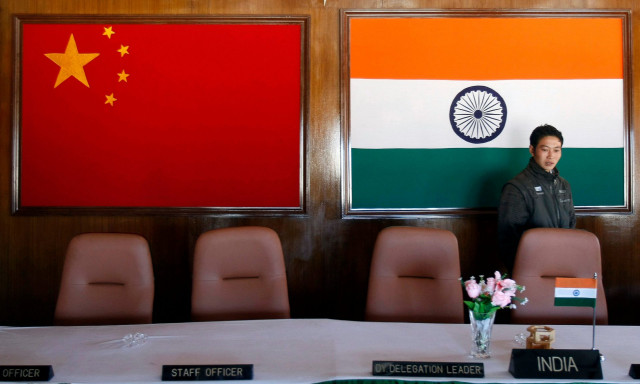Kashmir’s role in boiling China-India tensions
There are others who argue Pakistan shouldn’t make this conflict about itself

A Reuters file image.
China was forced into the Kashmir dispute because of India’s unilateral annexation of Kashmir on August 5, 2019, when the Indian government announced the revocation of Article 370, argues Chinese scholar Wang Shida, days before the violent Indo-China standoff.
“India ‘opened up new territory on the map,’ incorporated part of the areas under the local jurisdiction of Xinjiang and Tibet into its Ladakh union territory and placed Pakistani-administered Kashmir within its so-called union territories of Jammu and Kashmir,” Shida wrote. “This forced China into the Kashmir dispute, stimulated China and Pakistan to take counter-actions, and dramatically increased the difficulty in resolving the border issue between China and India.”
Shida further noted that the Chinese Foreign Minister articulated these concerns in his meeting with Indian Minister of External Affairs Subrahmanyam Jaishankar by arguing “India’s moves challenged China’s sovereign rights and interests and violated the agreement on maintaining peace and tranquillity in the border areas between the two countries.”
Meanwhile, Kashmir is noticeably underplayed in Washington DC, when unpacking the recent flare up of Indo-China violence. Instead, the focus of the chattering class inside the beltway is on China’s assertive rise as a global power and the tactical questions about troop deployments and infrastructure build up around the Line of Actual Control (LAC).
This is consistent with how America and India viewed China’s initial reaction to India’s annexation of Kashmir last year. They thought Chinese statements were meant to soothe Pakistan but there might be more at play here. Indian policymakers are understanding that they underestimated Chinese anger around Indian aggression in Kashmir but it’s difficult for them to acknowledge this publicly, given the amount of political capital Modi invested in the revocation of Article 370.
Meanwhile, Pakistan’s official position on the Indo-China border spat is that it’s a bilateral issue, which appears to be a neutered stance, given how Pakistan could take advantage of the situation to give India a hard time. This could possibly be rooted in Chinese advice to sit this one out at a time when both China and India are trying to de-escalate the situation. It could also be a calculation that we don’t want to trigger India to heal their bruised ego by taking on Pakistan.
“Modi’s infamous 56-inch chest has collapsed as a result of Chinese action,” shares Syed Ali Zia Jaffery at the Center for Security, Strategy & Policy Research in Lahore. The question now is how Modi will dig India out of the ditch he’s dug. Many commentators like Mosharraf Zaidi fear India’s next attack is coming, “After India’s defeat at Galwan Valley, Pakistan must be prepared for India’s next attack. It is almost certainly going to be directed at this country.”
There are others who argue Pakistan shouldn’t make this conflict about itself. Speaking at a virtual conference by the Corporate Pakistan Group, Dr Adil Najam argued that “the best thing Pakistan can do is to not make this about Pakistan. This is about Kashmir. Pakistan doesn’t have the international credibility to speak on their behalf. Kashmiris do because of 70 years of real struggle and commitment.”
There’s a Napoleon Bonaparte quip, which sums up Pakistan’s foreign policy beautifully, both on Kashmir and China versus India tensions: “Never interrupt your enemy when he is making a mistake,” Pakistan would do well by following his advice.
Published in The Express Tribune, June 28th, 2020.
Like Opinion & Editorial on Facebook, follow @ETOpEd on Twitter to receive all updates on all our daily pieces.














COMMENTS
Comments are moderated and generally will be posted if they are on-topic and not abusive.
For more information, please see our Comments FAQ